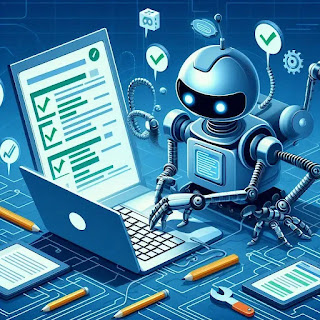AI-Generated Tests: Revolutionizing Software Testing
What Are AI-Generated Tests?
AI-generated tests are automated test cases created using
artificial intelligence and machine learning algorithms. These tests analyze an
application’s behavior, identify patterns, and generate test scenarios that
improve software quality. Unlike traditional manual testing, where developers
write test cases for specific functions, AI-generated tests autonomously
generate a broad range of test cases based on code structure, API interactions,
and historical test data.
How AI Generates Tests
AI-driven test generation follows a structured process that
includes the following steps:
- Code
and API Analysis – AI scans the application to understand logic,
input-output relationships, and dependencies.
- Test
Case Generation – It creates a variety of test cases, including unit,
integration, and regression tests.
- Self-Learning
& Optimization – Machine learning algorithms refine test cases
based on historical test execution results.
By leveraging AI, organizations can shift from reactive
testing to proactive test automation, ensuring that critical defects are caught
early in the development lifecycle.
Benefits of AI-Generated Tests
AI-powered test generation provides several advantages that
make it a game-changer for software testing:
1. Faster Test Creation
AI dramatically reduces the time required to write test
cases manually. It can generate hundreds of test scenarios in minutes, helping
teams accelerate their testing process.
2. Improved Test Coverage
AI ensures comprehensive test coverage by identifying and
testing edge cases that developers might overlook. This results in more robust
and reliable applications.
3. Reduced Maintenance Effort
Traditional test automation scripts often require constant
updates when applications evolve. AI-generated tests, particularly self-healing
tests, automatically adapt to code changes, reducing maintenance overhead.
4. Enhanced Accuracy and Efficiency
By eliminating human error in test case design, AI-generated
tests produce more reliable and efficient test suites that help in detecting
software bugs early.
Popular AI-Powered Test Generation Tools
Several tools leverage AI for automated test generation.
Here are some of the most prominent ones:
- Keploy – An AI-driven open-source test
case generator that captures API interactions and converts them into test
cases.
- Diffblue
Cover – Uses AI to generate Java unit tests automatically.
- Testim
– AI-powered test automation for UI and functional testing.
- Applitools
– Uses visual AI testing to detect UI anomalies.
Among these, Keploy stands out as an open-source
AI-powered test generation tool that enables developers to generate test cases
without requiring manual effort.
How Keploy Enhances AI-Generated Tests
Keploy simplifies and enhances AI-generated test automation
in multiple ways:
- Automatically
Capturing API Interactions – Keploy records and converts real API
calls into deterministic test cases, removing the need for manually
written API tests.
- Ensuring
High Test Coverage – It intelligently identifies and generates test
cases to cover various scenarios, including edge cases.
- Seamless
CI/CD Integration – Keploy integrates effortlessly into existing CI/CD
pipelines, making automated test generation and execution a smooth
process.
By leveraging Keploy, development teams can ensure faster
releases while maintaining software reliability.
Challenges in AI-Generated Test Cases
Despite its advantages, AI-generated testing has its own set
of challenges:
- Handling
Dynamic and Flaky Tests – AI-generated tests may struggle with dynamic
elements in UI or APIs, leading to flaky tests that need additional
validation.
- Interpreting
Business Logic – While AI can generate test cases, validating business
logic and critical workflows still requires human oversight.
- Training
Data Dependence – The effectiveness of AI-generated tests depends on
the quality and quantity of training data available.
Best Practices for AI-Generated Testing
To maximize the effectiveness of AI-generated testing,
organizations should follow these best practices:
- Combine
AI with Manual Testing – AI should complement manual testing efforts
rather than replace them. Manual validation ensures that critical business
logic is covered.
- Regularly
Review and Validate Tests – Teams should periodically review
AI-generated test cases to ensure their relevance and effectiveness.
- Monitor
AI Performance – AI models should be continuously refined based on
real-world test execution results.
Conclusion




Comments
Post a Comment